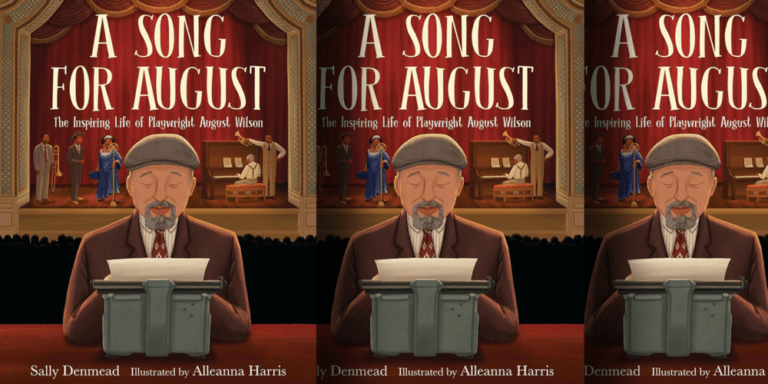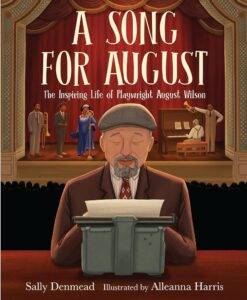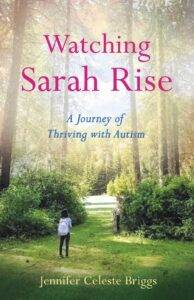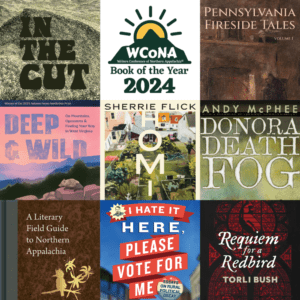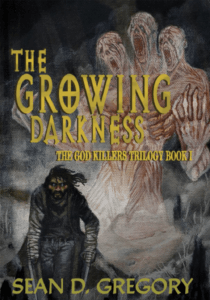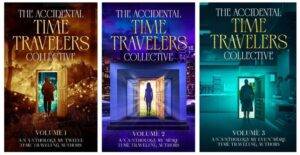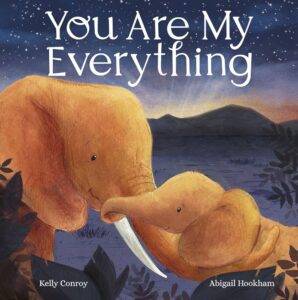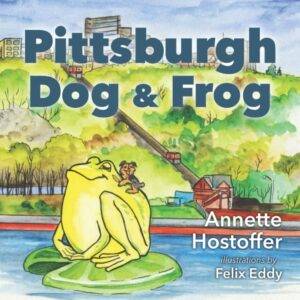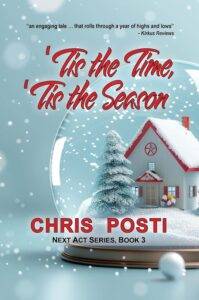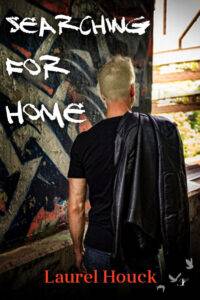From the Publisher: “An ode to one of America’s foremost Black playwrights, August Wilson, and a meditation on culture, erasure, and what ultimately drives an artist’s desire to create.
August Wilson grew up open to the creative inspiration in everything he encountered: in library books, in music, in artworks, in the lively conversations overheard in the restaurants and barbershops lining the Pittsburgh neighborhood of his childhood. August paid attention. He listened. And when he got older, he got ideas about what to do with everything he’d seen and heard — ideas that would make him one of the greatest playwrights in American history.”
More info About the Author: “Sally Denmead is a classically trained singer and actor who has been performing on stage for most of her life. She has performed many classic opera roles with the Amato Opera in New York City and many Gilbert & Sullivan roles with the Pittsburgh Savoyards since moving to Pittsburgh 20 years ago. Her love of theater and adopted home of Pittsburgh led her organically to the plays of Pittsburgh’s own August Wilson, arguably the greatest American playwright of the late 20th century. Her longstanding familiarity with the children’s book world led her to believe she could write a picture book biography of Wilson, by far her favorite dramatist. And so she did! It’s entitled A Song for August and is her first trade picture book.”
Author Site Don’t miss out: Riverstone Books (Squirrel Hill location) will be hosting a “Toddler Storytime Special” featuring Sally Denmead on Sunday, August 11th at 10:30 a.m.
Event Info
What was it about August Wilson that drew you to want to write his story?
I LOVE theater – especially plays – and I remember looking around seven or eight years ago and noticing that, except for William Shakespeare (of course), there were NO books on playwrights out there for kids!
Look, not to throw shade on the Bard, but he is not the only playwright in the world. We have extraordinary playwrights right here in America (some of us have them in our own back yards, right Pittsburgh?) Anyway, we don’t have to go all the way to England – or back 400 years – to find them.
What I wanted to do with A Song for August was inspire kids with the message “Hey, YOU could be the next great playwright/poet/storyteller!” If little Frederick August Kittel (that was August Wilson’s given name before he changed it) could start writing poems in grade school, why not you?
August Wilson was a whip-smart kid who loved language and had a sense of what he wanted to do with it. And he didn’t let anything stand in the way of that need to express himself through writing. Right from the beginning of his story, you’re rooting for him and you just want to see what this kid will do with his life. And what he does is pretty extraordinary!

Music was vitally important to Wilson as a person and as a playwright. The word “song,” particularly, comes up often in your book, both in the title and in the line “Everyone carries a song inside them….” Please talk about this literal and figurative idea.
I love this question because the literal and the figurative are so intertwined in Wilson’s plays – and that makes sense, because he was a huge fan of the works of the late, great Argentine writer Jorge Luis Borges.
Reading Borges introduced Wilson to the genre of Magical Realism, and Magical Realism gave Wilson the literary license to blur the boundaries between the real and the supernatural in his plays. (So, for example, he’ll write a scene comprised of realistic, everyday situations and dialogue, but then a ghost will arrive and throw someone down the stairs, or he’ll have a community in which there is a 322-year-old woman who people come to for healing, or he’ll send a character on a trip to the bottom of the ocean to see the reanimated bones of his ancestors, that sort of thing.)
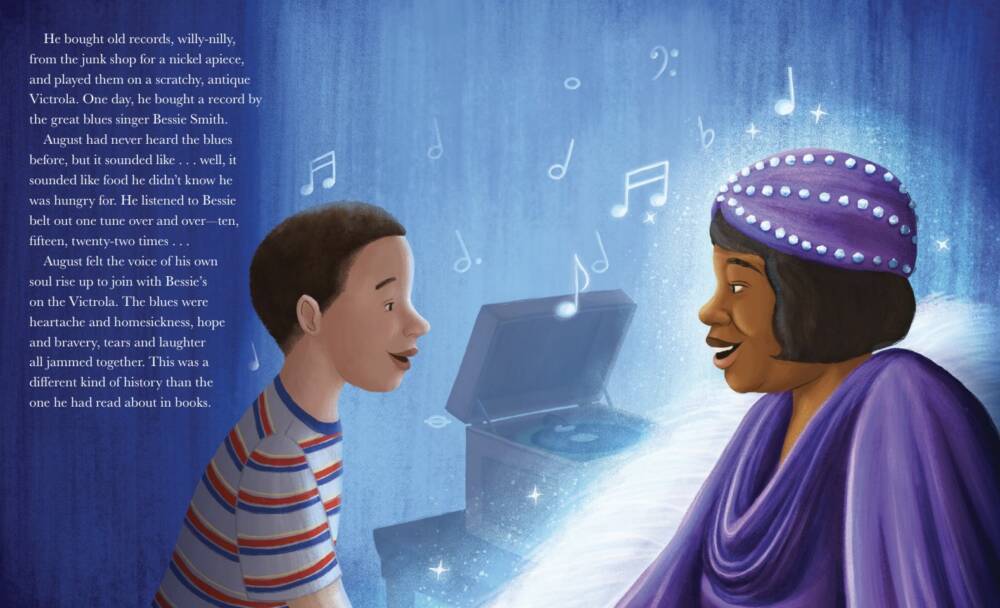
But getting back to your question, there is literally a lot of music in Wilson’s plays! We have guitar players, piano players, blues singers, trumpet players – you name it. Three out of the ten plays in his Century Cycle have musicians as protagonists. There is no Wilson play that is not carried along by what feel like spontaneous bursts of song and rhythm.
I myself am a singer by training, so let me tell you; this idea of an individual having their own song? WOW! That idea really resonated with me because a voice is such an individual, personal thing – we equate it with our identity. Our individual voice is something fragile that we want to protect, and when it fails us, we feel invisible. So, speaking figuratively, in August Wilson’s lexicon the word “song” has many meanings. It can be defined as an individual’s essence, or soul; their sense of self-worth – even their destiny. But it is also a gift – as in something given to you by those who came before you, and it is meant ONLY for you.
Let’s not misunderstand Mr. Wilson; your song is not just some jaunty tune you go along singing. Your song is made up of your history, your ancestry, your memories – and those things can get pretty heavy. Maybe so heavy you don’t want to sing that song. But Wilson is saying you have to sing it if you are going to find yourself, because you are the only one who knows that song – no one can sing it for you. The line “Everyone carries a song inside them” from A Song for August is my distillation of a long monologue from my favorite Wilson play, Joe Turner’s Come and Gone, where Wilson treats the song as a kind of lifeline that tethers an individual (in that play, Herald Loomis) to his sanity and sense of self-worth.
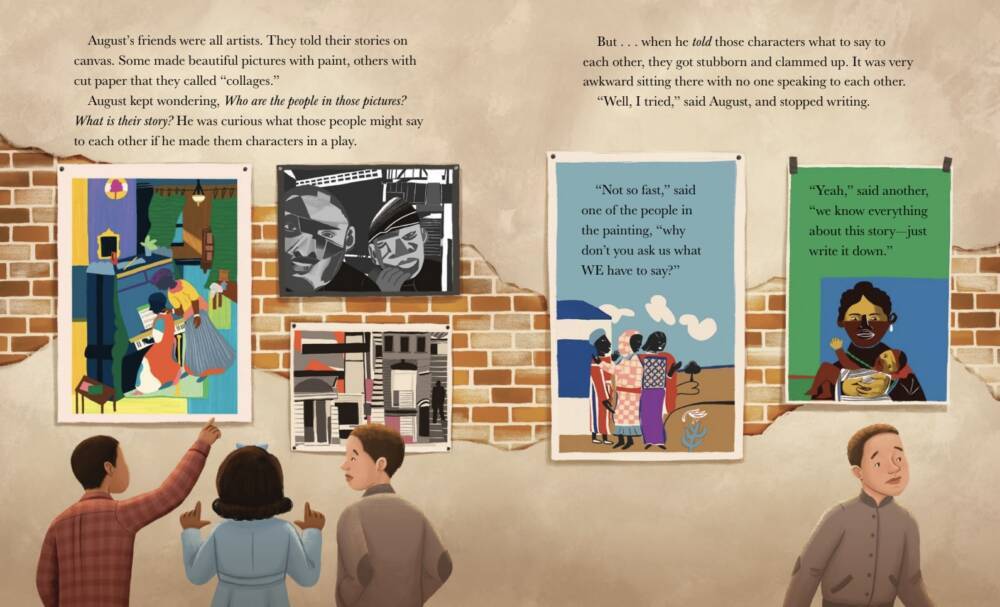
A biography about August Wilson will certainly appeal to adults who are familiar with his work, but how did you negotiate the challenges of writing about him in a way that will resonate with children?
This may sound crazy, but it was actually easy – at least in the sense that I never felt like I was going out on a limb placing August Wilson as the subject of a book for children – and that was chiefly because Wilson’s early years were just so interesting!
Okay, August Wilson was never bitten by a radioactive spider (we have confirmation), but otherwise, his “origin story” has a lot of classic superhero elements: raised in poverty; an absent, bullying father; a strong and intelligent mother who initiates him into the cult of (in his case) reading. And then outside the home, he’s constantly having to fend for himself on the mean streets (and in the mean classrooms) of Pittsburgh, hounded at every turn by people who literally want to do him harm.
But now we’re getting to the most important superhero element of all: through it all he has this innate sense of himself as someone with a destiny. He knows very early on that he wants to be a writer – a poet, even. And early on he finds for himself a place of sanctuary – which also becomes his place of power – and that is the library, that magical space he can access solely by virtue of the fact that he can read.
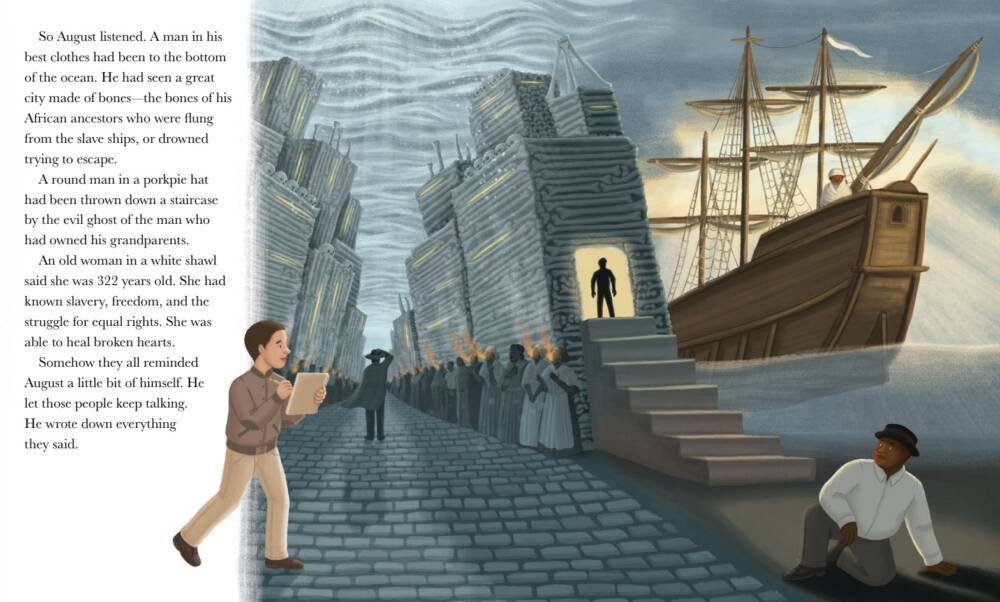
Of course, it can’t be denied that Wilson’s plays are for grown-ups. They are long, the language is dense and poetic, and the situations and themes are adult. But when it was announced that Denzel Washington was going to make a movie out of Fences, I immediately had a sense that August Wilson was about to become a household word – even in households that weren’t interested in theater, per se – and I wanted kids to be able to participate in that excitement, too.
In Wilson’s case, the child was in every way the father of the man. I must gush a little when I say that that idea is so beautifully reinforced in the illustrations for A Song for August. Alleanna Harris depicts him as a youth for much of the book and then we get to see his iconic adult image revealed at the end.
You could say that with this book, I set out to make a kind of “August Wilson Primer” for very young children. I wanted kids to discover August as a kid, with the hope that that would open the door to their being curious about his plays later in their lives.
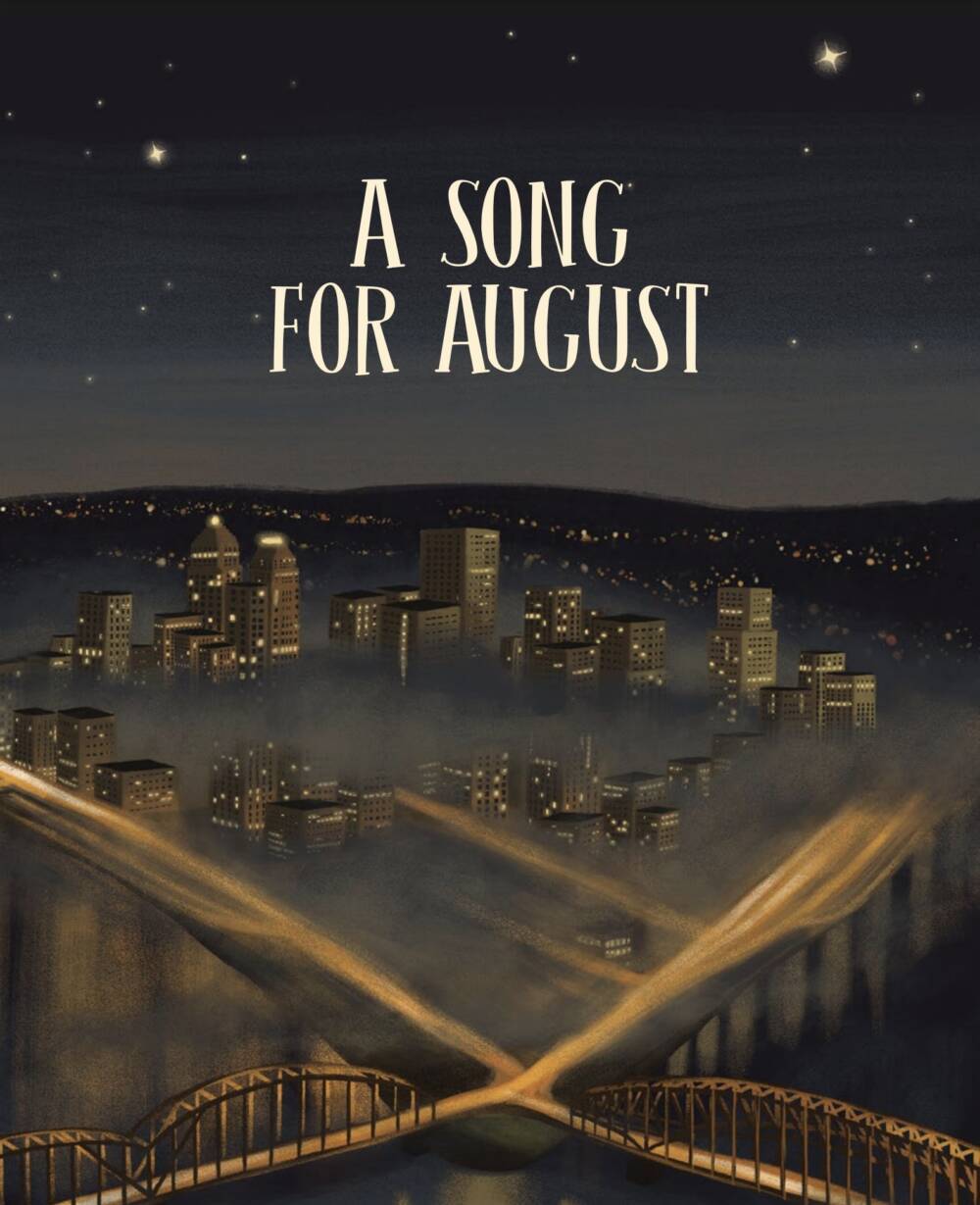
What impact did the journey of creating your book have on you? In other words, what kind of growth did you experience in the process of creating your book?
I got to take a luxurious dive into reading the plays that make up the Century Cycle – and reading them is a very different activity than watching the plays (although watching them is always a huge thrill). By reading them, first of all, you get to experience them in chronological order! You also get to take your time with them, and I found that I was better able to notice and appreciate the themes and patterns, the reoccurring family names, and the sense of movement-through-time that tie these ten plays together.
What do you hope readers will take away from your story?
What I hope readers will take away with them from A Song for August is two-fold: a budding interest in August Wilson and a new respect for the power of reading, the places it can take us, and its role in shaping our souls.
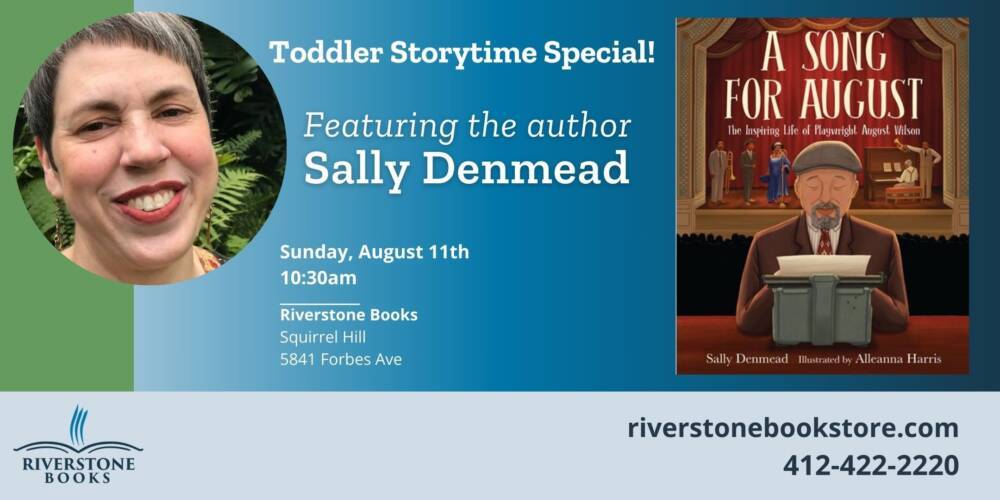
The images in this spotlight are published here courtesy of the author and publisher and should not be reprinted without permission.


